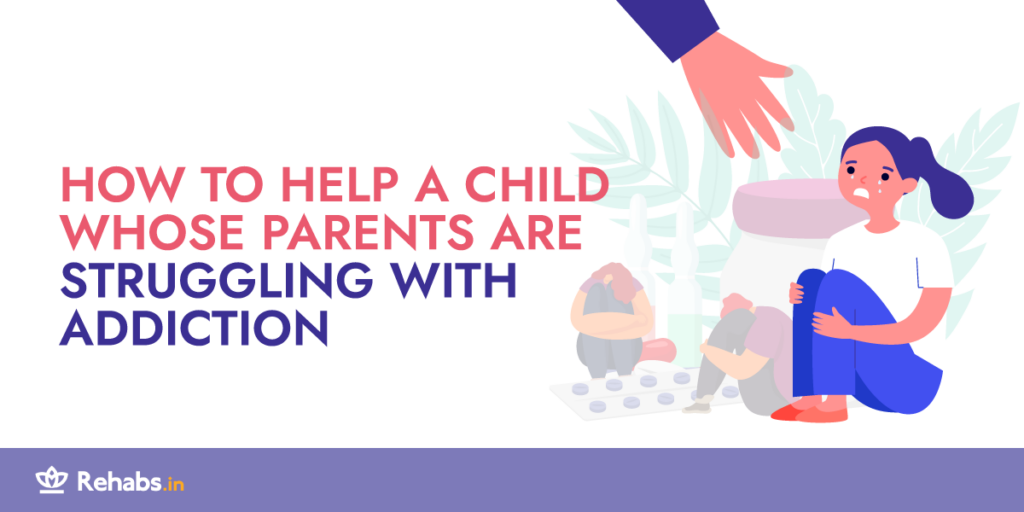How to Help a Child Whose Parents are Struggling with Addiction

Addiction is a serious problem that affects not only the person struggling with it but also those around them. You might know a child or teenager who is going through a tough time because of parental addiction. Whether you’re a family member, guardian, teacher, or coach, you may feel unsure about how to help the child or if you should even get involved.
When parents are addicted to substances, it can cause many problems for their children. These problems include not getting their needs met, having difficulties forming healthy relationships, facing financial and legal troubles, dealing with emotional issues, experiencing abuse, and being more likely to develop their own drug problems. Research shows that it’s really important to offer treatment and support to both the parents and their children and other family members who are affected by addiction.
In this article, we will explore various ways to support a child dealing with parental addiction and help them navigate through this challenging situation.
Understanding the Impact of Addiction on Children
Kids who grow up in families with substance use problems often encounter challenges in their parenting experience and difficulties in academic, social, emotional, and behavioural functioning. The presence of parental drug use frequently coincides with instances of child neglect within these families. Additionally, the addicted parent often experiences a significant sense of guilt for their inability to provide for their children, which may increase their substance use struggles.
Throughout their development, children depend on their family members for love and support, as these factors significantly contribute to their physical and mental well-being. However, when a parent grapples with addiction, the child is at a heightened risk of being exposed to various traumatic events and facing a greater susceptibility to physical and sexual abuse.
The repercussions of these challenges often endure as children transition into adulthood. In cases where a mother uses drugs even during pregnancy, it can lead to permanent birth defects. Neglected children may experience impaired growth and physical abnormalities. Furthermore, adult children of alcoholics have an elevated likelihood of developing depression and engaging in self-harming behaviours.
Recognising Signs of Distress in Children
Determining whether a child requires support involves paying attention to certain behavioural and emotional indicators. Here are some signs to be mindful of:
Behavioural Signs:
- Increased tendency to spend time alone and limited interaction with peers or family members.
- Displaying intense anger outbursts or frequent temper tantrums.
- Decline in academic performance and diminished interest in school activities.
- Notable changes in appetite, such as overeating or loss of appetite.
- Disruptions in sleeping patterns.
Emotional Signs:
- Expressing anxiety and fear regarding their own safety and their parent’s well-being.
- Symptoms of depression include persistent low mood and feeling guilty for their parent’s addiction.
- Diminished self-esteem and heightened anxiety in social interactions.
- Frequent complaints of physiological ailments, like headaches or stomach aches.
- Continuous feelings of fatigue and being emotionally drained.
It is important to acknowledge that while certain indicators may align with typical developmental experiences, the manifestation of sudden and pronounced changes suggests the presence of an underlying issue. Recognising these indicators serves as the initial stride in assisting children in navigating the complexities associated with parental addiction. While some signs may be expected during the natural course of growth, abrupt and substantial alterations should be regarded as potential indicators of distress.
Creating a Supportive Environment
Navigating the challenges that arise from having parents with drug addiction can be an immensely difficult task for children to undertake on their own. Recognising the importance of assisting these children, creating an environment prioritising their well-being and safety becomes crucial. In order to achieve this, here are some effective strategies that can be employed to provide the necessary support, fostering resilience amidst the complexities of this challenging situation.
Open and honest communication
Talking openly and honestly can help you understand what’s going on better. Encourage the child to share their feelings, and really listen to them and show that you understand. It’s important to give them information about addiction that is right for their age, so they can understand what’s happening. Remember to be patient and let them open up when they’re ready. Starting with a casual conversation can help you get to know each other better and build trust.
Establishing a safe and stable environment
The experience of growing up with an addicted parent can make life uncertain and unstable for a child. But trying your best to create a stable and consistent environment is important. This means having regular routines and schedules. Ensuring they eat meals and go to bed at the same time every day can help them stay healthy and feel more in control of their lives.
Ensuring that they have regular mealtimes and consistent sleep patterns can positively contribute to their overall health and provide them with a sense of control over their lives.
Promoting healthy coping mechanisms and self-care for the child
Encourage them to deal with their challenges by doing things they enjoy, like playing sports, doing art, or other hobbies. Teach them simple relaxation techniques, like taking deep breaths or focusing on the present moment. Show them how to take care of themselves by getting enough rest, eating well, and taking breaks when needed. You can even join in these activities with them to support and bond with them.
Seeking Professional Help
Children of addiction not only take care of themselves but also assume the role of parenting their own parents. Addiction, being a disease, profoundly impacts the overall well-being of the entire family, including their physical health problems and emotional and financial problems. When a parent might be coming home drunk or high, it may fall upon the children to shoulder the responsibility of caring for them.
The drug-addicted parent might even resist seeking external assistance due to the fear of potentially losing legal custody of their child. While some situations may be manageable within the family, external intervention becomes necessary if the safety and well-being of the child are at risk. Look out for the following signs:
- Basic needs like food, shelter, clothing or medical care are not being met adequately.
- Exhibiting persistent signs of depression, anxiety, and aggression.
- Significant sudden change in behaviour or academic performance.
- Signs of physical abuse or domestic violence
- Signs of drug or alcohol use by the child
- Unwillingness or inability of the addicted parent to seek help.
Therapeutic Approaches and counselling options for Children
The journey of recovery for children with addicted parents starts by rebuilding their self-confidence and learning how to develop trusting relationships once again. Many rehabilitation centres also provide specific programs tailored for children in such situations. Treatment options for children include:
- Participating in peer support groups for sharing experiences in a safe environment.
- Working with mental health professionals for talk therapy.
- Play therapy is a valuable therapeutic approach for younger children who may have difficulty expressing their emotions verbally.
- Family therapy involves the participation of both the child and their addicted parent(s). This approach aims to improve communication, rebuild trust, and strengthen family relationships.
- Benefiting from a trauma-informed approach tailored to their needs.
- Additionally, there are specific 12-step programs available. These programs are designed for adult children of alcoholics and dysfunctional families. They offer targeted support and guidance for individuals in similar situations.
Collaborating with schools and community resources can provide additional support for children of addicted parents. Schools can offer counselling services and create a supportive environment, while community resources such as support groups or social services can provide valuable resources and assistance to both the children and their families.
Educating and Empowering the Child
Providing age-appropriate information about addiction and its effects is essential for children of addicted parents to understand their situation and develop coping strategies. Educating children about addiction in a way they can comprehend helps empower them to make informed decisions, reduces confusion, and promotes healthier attitudes towards addiction.
It is important to help the child understand that their parent’s addiction is not their fault. Providing reassurance and explaining that addiction is a complex disease unrelated to their actions or behaviour can alleviate feelings of guilt and self-blame, allowing the child to focus on their own well-being and recovery.
Teaching resilience and coping strategies is crucial in fostering the emotional well-being of children with addicted parents. By equipping them with effective tools to navigate challenges, manage stress, and bounce back from adversity, we empower these children to develop resilience and maintain a positive outlook on their journey towards healing and growth.
Building a Support Network
Engaging family members, friends, and trusted adults in the child’s life can provide a valuable support network. By involving these individuals, we create a sense of stability, love, and guidance, helping the child feel understood and fostering a nurturing environment that promotes their overall well-being.
There are also several support groups available for children of addicted parents. Some well-known ones include Adult Children of Alcoholics (ACA), Al-Anon, Families Anonymous, and SMART Recovery for Friends and Families. These groups offer a supportive environment where individuals can connect, share experiences, and find guidance on their journey towards healing and recovery.
By surrounding them with supportive individuals who exemplify positive behaviours and values, we can inspire and guide these children towards healthy relationships and provide them with positive influences to help them navigate their own paths in life.
Taking Care of Yourself as a Caregiver
It is difficult to care for a child going through such struggles. You must recognise the importance of self-care and even seek support if necessary. By prioritising your well-being and seeking help from trusted sources, you can better support the child and maintain your resilience, ensuring you can provide the care and support they need.
Conclusion
Parental addiction affects not only the individual struggling but also children, leading to various challenges like unmet needs, relationship difficulties, financial problems, emotional distress, abuse, and increased risk of substance abuse. To support children with addicted parents, it is crucial to provide treatment and support for both parents and children, recognise distress signs, foster a supportive environment, seek professional help, collaborate with schools and community resources, engage trusted individuals, utilise support groups and promote healthy relationships.
Consistent support, understanding, and empathy are essential for the overall well-being and recovery of children with addicted parents, enabling them to navigate difficulties and develop resilience effectively. By increasing awareness and cultivating understanding, we inspire optimism for a better future, empowering these children to overcome challenges, heal, and build a promising and fulfilling life ahead.
If you’re looking for a treatment centre for a person with alcohol or drug addiction or adult children of addiction, you can browse our directory of rehabs all across India here.
Sources:
Lander, L., Howsare, J., & Byrne, M. (2013). The Impact of Substance use Disorders on families and Children: From Theory to practice. Social Work in Public Health, 28(3–4), 194–205. https://doi.org/10.1080/19371918.2013.759005
Solis, J. M., Shadur, J. M., Burns, A., & Hussong, A. M. (2012). Understanding the Diverse Needs of Children Whose Parents Abuse Substances. Current Drug Abuse Reviews, 5(2), 135–147. https://doi.org/10.2174/1874473711205020135
Substance use while pregnant and breastfeeding | National Institute on Drug Abuse. (2022, May 4). National Institute on Drug Abuse. https://nida.nih.gov/publications/research-reports/substance-use-in-women/substance-use-while-pregnant-breastfeeding













